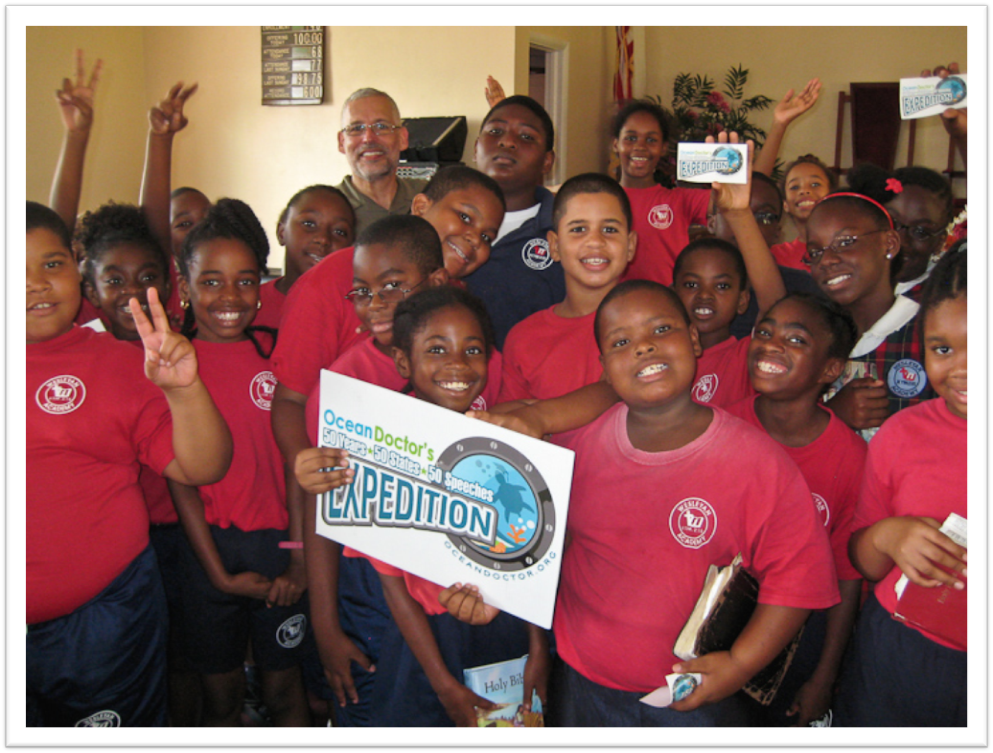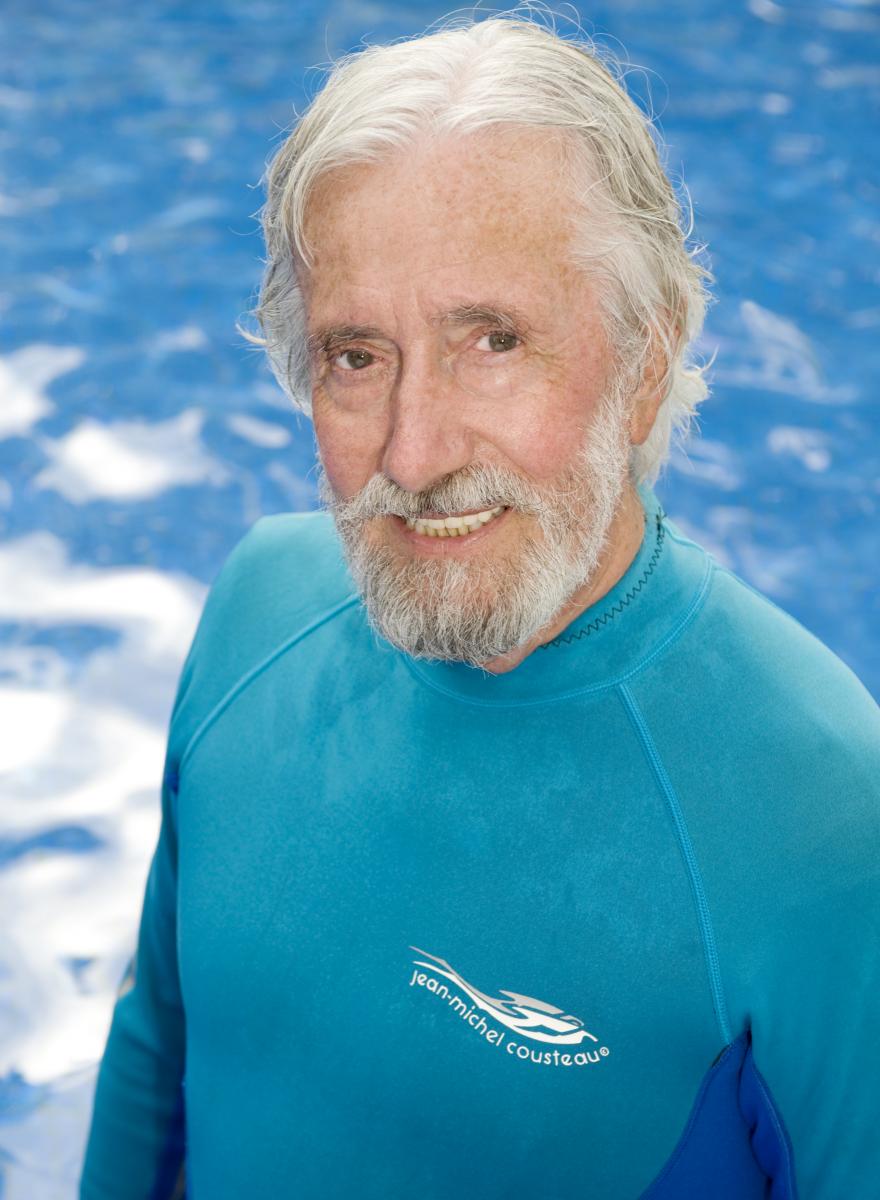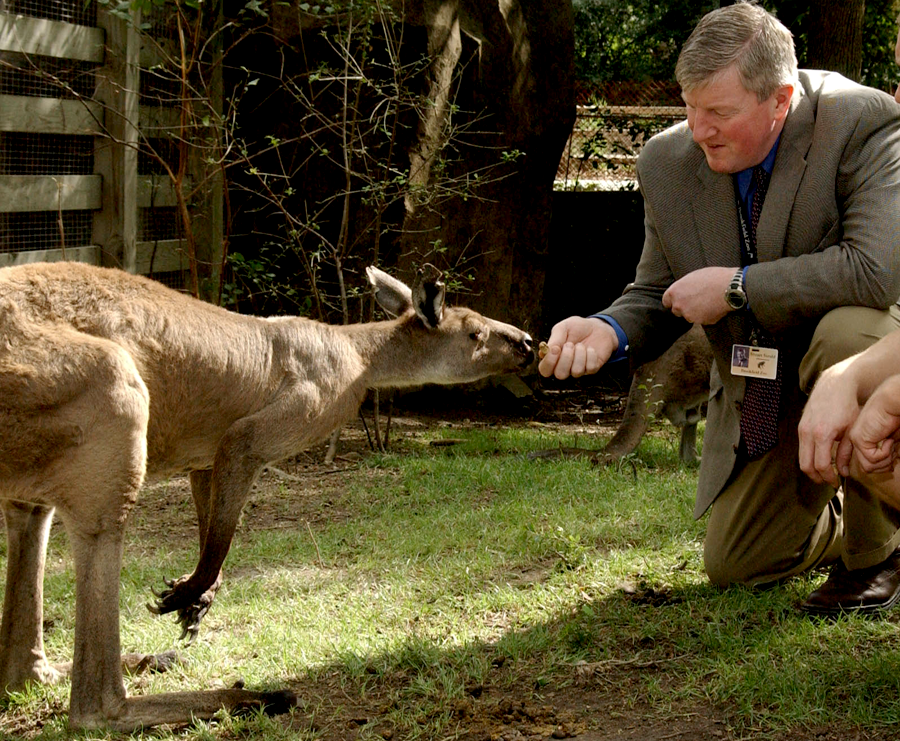Is the Next Generation Ready for the Next Generation of Challenges?
.png)
A wonderful visit to Golden Gate Elementary School, Naples, Florida
A decade or so ago, an article appeared in the Palm Beach Post quoting me as saying, “The leaders we have to reach are in diapers today.” I was referring to the largest environmental restoration project in history — the Everglades — and the fact it would take unwavering dedication and stewardship over decades to ensure its success. (I was speaking in my former role as president of The Conservancy of Southwest Florida and co-chair of the Everglades Coalition.) I suppose those once-diapered kids I was referring to are now in elementary school, which is why I was intrigued to hear explorer Scott W. Hamilton, speaking at the Explorers Club Annual Dinner last year, state that “the next commander of a manned mission to Mars is in elementary school today.” The daunting challenges ahead of humanity — whether restoring ecosystems, saving coral reefs, battling climate change or holding the first handful of red sand on Mars — are decades-long efforts that can’t rest on the shoulders of a single generation. So is the next generation more ready than we were to take on such challenges? I’m in the process of finding out.
I’ve been on the road constantly, giving speeches to K-12 schools in what I hope will soon be all 50 states plus U.S. territories. So far I’ve reached 16 states and one U.S. territory, bringing presentations to more than 15,000 students about the wonders of the ocean and the threats it faces.
What began as a deeply personal quest to celebrate my 50th birthday and honor the memory of my father (who shared his love of the ocean with me but was lost at sea just before his 50th birthday) has evolved into something much more. As I’ve listened to students’ cheers, applause and even shrieks during my presentations, spoken with them individually and looked into their wide, excited eyes, it’s become clear I’ve tapped into an enormous, pent-up passion, fascination and love of the oceans that I must admit even I had underestimated. Such enthusiasm is incredibly strong even among the thousands of students I’ve visited that have never seen an ocean.
.png)
Speaking to 400 students in the gymnasium at Midway Middle School, Georgia
I’ve had similar responses from the teachers (well, except for the shrieks), some of whom were furiously scribbling notes as I spoke. They later told me how much of what I presented they never knew themselves and that they intended to incorporate it into their curriculum. I’ve met some incredible teachers and seen firsthand their extraordinary achievements and selfless dedication to bringing the gift of a strong science education to their students, often amid massive budget cuts and maddening administrative bureaucracies.
There is an incredible thirst among today’s students for clues to the mysteries of the oceans, how those blue waters affect their lives and vice versa, and what exciting, rewarding careers await them in science and especially, marine science. Unfortunately, few of these children are getting from their standard curriculum. I’ve been humbled by seeing that there are legions of natural allies for the cause of ocean conservation out there, students and teachers alike eagerly asking what they can do to help.
A project of The Ocean Foundation, the Ocean Doctor’s “50 Years, 50 States, 50 Speeches Expedition” takes me back to my roots as a marine science teacher and I still find it every bit as fulfilling to watch young eyes widen, perspectives change and horizons broaden when the students I visit with learn about the sea and its mysteries. It is also gratifying to realize that a 50+ year-old ocean doctor is capable of learning so much from the students and teachers he encounters, and that his heart capable of being deeply moved by the faces, lives and stories he encounters on his journey.
.png)
Macksville High School, Kansas, definitely ?in the middle of somewhere?
I visited a high school of just 100 students in Kansas, not far from the geographical center of the lower 48 states, a community that had recently been devastated by two killer tornadoes. They apologetically referred to their community, Macksville, as being “in the middle of nowhere.” But after spending the afternoon with some delightful high school students, I came away with a very different opinion of a remote but remarkably resilient place where the terrible tragedies of two years ago had brought their community together like never before. To me, it most definitely felt like a ‘somewhere.’ The students shared with me their love of nature, mostly hunting and fishing among local lands. Their experiences were vastly different from mine, but we shared a great appreciation for the outdoors.

My first visit to Mt. Rushmore and to the enormous Central High in Rapid City, SD High School!
In the shadow of Mt. Rushmore, nestled within the Black Hills, I visited the massive Central High School and its 2,300 students in Rapid City, South Dakota. I had fascinating discussions with the faculty, discussing the importance of such exchanges and how much we still have to learn from each other across such a large and diverse country. It’s not only the oceans that we need to learn about. The assistant principal told me that a few years ago, a fellow teacher from an eastern city had asked her if Indians still live in tee-pees in South Dakota. She informed the individual, “No, they live in houses.” She still can’t believe that such a question could have been asked by a teacher.
.png) Stranded for two days in Fairbanks, I befriended Eskimo families who were also stranded, and learned about their ways, history, and intimate connection to the sea. Finally making it to my destination — the northernmost settlement in North America: Barrow, Alaska — I spent the day with three delightful fourth grade classes, some of them relatives of the families I had met earlier. While outside the temperature plunged to -43 degrees F, the children told me about their customs, including the annual whale hunt.
Stranded for two days in Fairbanks, I befriended Eskimo families who were also stranded, and learned about their ways, history, and intimate connection to the sea. Finally making it to my destination — the northernmost settlement in North America: Barrow, Alaska — I spent the day with three delightful fourth grade classes, some of them relatives of the families I had met earlier. While outside the temperature plunged to -43 degrees F, the children told me about their customs, including the annual whale hunt.
.png) I spoke to at-risk middle school boys and girls at Boys Town, Nebraska, the school made famous by the 1938 film and from where the famous expression, “He ain’t heavy, he’s my brother” originates. It is a school that continues a rich tradition of helping these children reach their potential.
I spoke to at-risk middle school boys and girls at Boys Town, Nebraska, the school made famous by the 1938 film and from where the famous expression, “He ain’t heavy, he’s my brother” originates. It is a school that continues a rich tradition of helping these children reach their potential.
I visited Elkhart, Indiana as part of an enormous community science/Halloween event known as “Science Spooktacular,” where more than 3,000 students from the area come out to learn about the wonders of science, planet earth, and this year, the oceans. Thanks to the wonderful leadership of Elkhart-based ETHOS (Encouraging Technology and Hands-On Science), the event was a great success and an inspiration to communities across the nation on how to engage schools, students, families and the broader community for an event that’s truly educational and fun.
.png) The event was especially inspirational as Elkhart, Indiana has been one of the hardest hit by the economic crisis, at times topping the national unemployment figures with a rate as high as 16 percent. Pulling off a successful event under such conditions was a monumental feat.
The event was especially inspirational as Elkhart, Indiana has been one of the hardest hit by the economic crisis, at times topping the national unemployment figures with a rate as high as 16 percent. Pulling off a successful event under such conditions was a monumental feat.
I’ve taught the students I’ve visited about the connections they have to the oceans, even if they’re living more than a thousand miles from the nearest salt water. I’ve shown them how 95 percent of the ocean has yet to be explored, and how it will soon be their turn at the helm — our next Lewises and Clarks! I’ve showed them how their landlocked farming communities might just be farming marine fish some day soon in high-tech, land-based recirculating aquaculture systems, which are a more sustainable alternative to depleting wild fish stocks. And I’ve given them a peek at the next-generation of technology that will take them to the bottom of the sea in Ironman-like pressure suits and deep-flying subs that resemble jet aircraft. A central theme is that careers in science are important and exciting. The Ecology Club at Morrow High, Georgia. The school has had no field trips for 5 years.
.png)
The Ecology Club at Morrow High, Georgia. The school has had no field trips for 5 years.
As the students are learning from me, I’m learning doubly from them. With just a quarter of the expedition completed, notes of my experiences and new insights about our schools and students already fill countless pages. Some of my observations were troubling. Unfortunately, young people still know very little about the oceans, and in many parts of the country, are increasingly living lives devoid of any contact with nature. Many of the students I’ve met had no idea about the critical issues facing the oceans, such as overfishing, pollution and the devastating impacts of climate change. In a poor community in Georgia, many students in the local high school have never traveled more than a few miles from home and have had virtually no experience with Mother Nature. The situation is made worse by the fact that the school hasn’t had any field trips in five years. Frustrated, one of the science teachers took students to a small stand of trees behind the school — scarcely more than one would find in the tree island landscaping of a local shopping mall — to do some rudimentary ecological measurements. One of her students thanked her ‘for taking us into the wilderness.’
Just as I’ve been pleasantly surprised by the wild enthusiasm and love for the oceans, I’ve been troubled to see that such emotions are often accompanied by a nearly equal level of fear. Two young girls in Nebraska didn’t raise their hands when I asked who had never seen the ocean but wanted to. I asked them, “Why not?” They looked at me in disbelief that it wasn’t obvious to me. “Sharks,” they said in unison.
.png)
6th Grader Shelby’s petition made it all the way to the U.S. Senate!
Fortunately, much of what I’ve learned has been positive and uplifting. Having spent very little time in the Midwest myself, I’ve been struck by the strong environmental spirit among many students there, born from the many hours they spend outside hunting, fishing and just plain hanging out. They haven’t needed an ocean in their back yard to ‘get it.’ I’ve seen a growing number of students involved in a new generation of green activities, such as ecology clubs and recycling clubs. I haven’t seen this level of interest or engagement since the first Earth Day nearly 40 years ago! I was especially inspired by a sixth grader near Atlanta named Shelby, who started a petition against shark finning, the cruel and unsustainable practice of slicing off a shark’s dorsal fin for shark fin soup, a practice that kills the animal. Her petition made its way all the way to the U.S. Senate in Washington,DC.
My work only begins when I complete a speech at a school. I’ve begun filling 50 bottles (representing each of the 50 states ) with messages from the students I visit, expressing their thoughts, hopes, and dreams about our oceans. I have promised to deliver these bottles to the Administration here in Washington at the completion of the expedition.
.png)
Just one of the many notes I’ve collected from students to deliver to Washington, DC
I’m also building a growing online network to connect all of the schools I visit to allow them to share their experiences and perspectives with one another, create their own ocean blogs, and interact with ocean experts to get advice about colleges and careers in science.
I’m giving radio and TV interviews along the way to build awareness about our oceans and science education. And I’m sharing my experiences through speeches at science, education and conservation conferences, and through my OceanDoctor.org posts and photographs.
.png)
Getting the word out on Wisconsin Public Radio
I know from my own experiences as a young teenager discovering marine science that the right kind of education experience can leave an enduring awareness and appreciation of the environment and its fragility. Please accept my invitation to join the expedition as one of its supporters and help me continue this unique and important journey of discovery and education to all 50 states. Your donation to The Ocean Foundation’s “Ocean Doctor’s 50 Years – 50 States – 50 Speeches Expedition” will ensure that I can continue to bring the awe and wonder of the ocean to students across the country, and bring their stories to you. Please help me continue to find the ocean in all of US.
.png) Your contribution is 100% tax-deductible and will help to make this effort possible. We’ll also recognize you by optionally displaying your name on the OceanDoctor.org site and printed materials! Use any of the following methods to contribute:
Your contribution is 100% tax-deductible and will help to make this effort possible. We’ll also recognize you by optionally displaying your name on the OceanDoctor.org site and printed materials! Use any of the following methods to contribute:
1. Send a Check by Mail
Please make your check payable to “The Ocean Foundation” and indicate that the contribution is to support the “Ocean Doctor’s 50 Years, 50 States, 50 Speeches Expedition Fund” and mail to:
The Ocean Foundation
1990 M Street, N.W., Suite 250
Washington, D.C. 20036
Telephone: (202) 887-8992 or (202) 507-9797
Email: info@oceanfdn.org
2.Online at The Ocean Foundation
Use Your Credit Card via The Ocean Foundation’s Secure Online Donations Page.
3.Online via Facebook
Use Your Credit Card via Facebook’s Cause page for the Expedition.
4. Make a Gift of Stock
The Ocean Foundation is set up to receive donations of stock through Citicorp Investment Services. For additional information, please send an email to The Ocean Foundation at : info@oceanfdn.org or call (202) 887-8992.
On behalf of the thousands of students who will get a chance to learn about the oceans and a future in science, please accept my sincerest thanks.
Sincerely,

David E. Guggenheim, Ph.D., the ‘Ocean Doctor’
Senior Fellow, The Ocean Foundation
.jpg)
 |

6th Graders in Granville, Ohio
| “What a fantastic day with the Ocean Doctor at Sassarini Elementary School in Sonoma, CA! The children were so amazed and awed by the video of octopus, submarines, coral, fishing boats, squid squirting ink on a submarine light, divers, Cuba, the Bering sea and Caribbean. It appeared to be the first introduction to the ocean for many of the children. Thank you so much Dr. Guggenheim for presenting at the assembly! It is greatly appreciated.”Julie Jehly (Watershed Stewardship Coordinator, Sonoma Ecology Center, Sonoma, CA)
“Ocean Doctor, David Guggenheim transported elementary students, college students and residents from local watersheds to hidden treasures in the ocean’s depths. He emphasized that stewardship of natural resources not only benefits local communities, but all downstream communities, including the most unexplored ocean depths. He encouraged young students to prepare themselves for a science career and be part of the next generation to further explore the ocean’s secrets. He was a captivating and energizing speaker. We would like to invite David back for future presentations.” Jim Kiracofe, (Administrator Licking County Soil and Water Conservation District, Ohio)
“There is nothing like seeing your student’s eyes light up with excitement (especially high school students!). The Ocean Doctor showed my students a world of wonder and awakened a passion in them even they didn’t know they existed. Simply wonderful!” Linda Southwick (Mathematics/AVID Teacher, Ventura High School) “Dr. Guggenheim gave a wonderful PowerPoint presentation with very vivid pictures. Our boys and girls were very interested in all he had to teach them about the ocean, coral and sea animals.” Cathy DeSalvo (Principal, Wegner Middle School Principal, Boys Town, Nebraska) |

Students in St. Thomas, U.S. Virgin Islands
.png)
.png)






Dear David, when do you think you will be visiting Seattle? I know the kid in me, would love to sit in on a discussion, and maybe bring you over to the Bainbridge Graduate Institute, an MBA focused on sustainability, for a presentation there! Nifty work! Very powerful. Be well, Kelleen